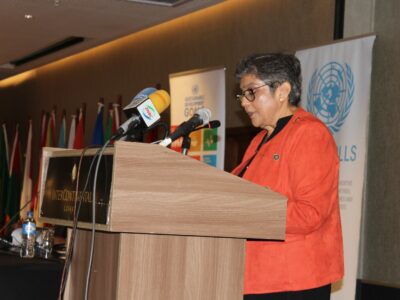The Zambian government has issued a warning about the presence of aflatoxin, a dangerous toxin, in some maize products in the market, which may have caused the deaths of 400 dogs in the past month.
Health Minister, Elijah Muchima, announced on Tuesday that these deaths were suspected to be linked to contaminated maize feed, which could cause severe health issues, including lung collapse and kidney damage.
Speaking at a press briefing in Lusaka, Muchima emphasized that the situation was under investigation to determine the full extent of the contamination.
“This raises significant concerns about our food supply,” Muchima stressed. However, he refrained from identifying the specific brands of maize found to contain the toxin, noting that investigations were still ongoing.
In addition to discussing the aflatoxin issue, Minister Muchima addressed recent reports suggesting that Monkeypox (Mpox) had been detected in Zambia.
He clarified that, contrary to these reports, there had been no confirmed cases of Mpox in the country.
Mpox, a viral zoonotic disease that can be transmitted through close contact between animals and humans, as well as from person to person, has been on the rise in several African countries, including Kenya, Uganda, South Africa, the Central African Republic, Côte d’Ivoire, and Nigeria.
The disease is characterized by symptoms such as fever, headache, muscle aches and swollen lymph nodes, followed by a rash that progresses through various stages.
The case fatality rate for Mpox stands at three percent, which is higher than the fatality rate observed during Zambia’s cholera outbreak.
Minister Muchima outlined the steps the government is taking to prevent the spread of Mpox within Zambia.
“The Ministry of Health will launch a nationwide public awareness campaign to educate citizens about Mpox, its symptoms, and preventive measures,” he announced. The campaign will utilize radio, television, social media, and community outreach programmes to ensure widespread awareness.
To further safeguard public health, Muchima assured that all public health facilities across Zambia were equipped to handle suspected Mpox cases, with enhanced infection prevention and control measures in place.
“In collaboration with the Ministry of Foreign Affairs, we will issue travel advisories to Zambians, especially those planning to visit areas with ongoing Mpox outbreaks,” he added.
Muchima also mentioned that while the World Health Organization (WHO) has declared Mpox a global health emergency and a Public Health Continental Significance, Zambia’s contingency plan is designed to ensure swift action if any cases were detected within the country’s borders.
Muchima reiterated government’s commitment to protecting public health, stating that all necessary measures were being taken to address both the suspected aflatoxin contamination and the potential threat of Mpox.
WARNING! All rights reserved. This material, and other digital content on this website, may not be reproduced, published, broadcast, rewritten or redistributed in whole or in part without prior express permission from ZAMBIA MONITOR.












Comments